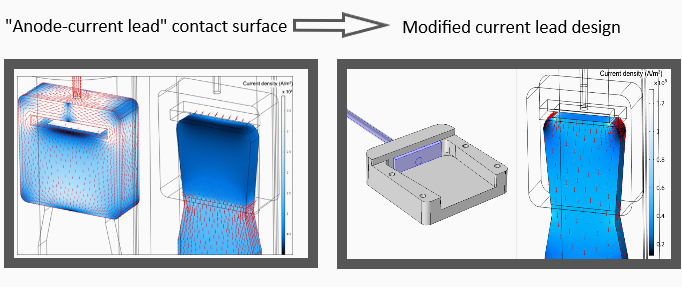
Development of heat transfer and electric current models of anode on the base of NiO-Li2O ceramics
Abstract
Keywords
Full Text:
PDFReferences
Zhitkov A, Potapov A, Karimov K, Shishkin V, et al., Interaction between UN and CdCl2 in molten LiCl-KCl eutectic. I. Experiment at 773 K, Nucl. Eng. Technol., 52 (2020) 123e134. https://doi.org/10.1016/j.net.2019.07.006
Fujita R, Pyrochemical Process in Molten Salts for Spent Nuclear Fuel Reprocessing and Radioactive Waste Treatments, ECS Trans., 86 (2018) 311–320. https://doi.org/10.1149/08614.0311ecst
Kim S-W, Jeon MK, Kang HW, Lee S-K, et al., Carbon anode with repeatable use of LiCl molten salt for electrolytic reduction in pyroprocessing, J. Radioanal. Nucl. Chem., 310 (2016) 463e467. https://doi.org/10.1007/s10967-016-4786-5
Shishkin AV, Shishkin VYu, Salyulev AB, Kesikopulos VA, et al., Electrochemical reduction of uranium dioxide in LiCl–Li2O melt, Atomic Energy, 131(2) (2021) 77–82. https://doi.org/10.1007/s10512-022-00850-y
Mullabaev AR, Kovrov VA, Kholkina AS, Zaikov YuP, Anode processes on Pt and ceramic anodes in chloride and oxidechloride melts, Nucl. Eng. Tech., 54 (2022) 965e974. https://doi.org/10.1016/j.net.2021.08.034
Yang Y-J, Yang L, Wang H-K, Zhu Sh-P, et al., Finite Element Analysis for Turbine Blades with Contact Problems, Int. J. Turbo Jet Eng., 4 (2015) 132–145. https://doi.org/10.1515/tjj-2015-0043
Takle ES, Russell RD, Applications of the finite element method to modeling the atmospheric boundary layer, Comp. Math. Appl., 16(1–2) (1988) 57–68. https://doi.org/10.1016/0898-1221(88)90024-7
Talal MM, Sarraf ZSh, Jamil SM, Finite Element Simulation and Stress Analysis of Gas Turbine Blade Due to Centrifugal Force, Int. J. Adv. Nat. Scie. Eng. Res., 7(6) (2023) 250–255. https://doi.org/10.59287/ijanser.1161
Jung H-W, Kim S-J, Kim Y-J, Kim J-Y, et al., Finite element analysis of vertical micro-probe considering Joule-heating effect, Int. J. Fat., 101(1) (2017) 96–105. https://doi.org/10.1016/j.ijfatigue.2017.02.021
Liu Ch, Kelly RG, The Use of Finite Element Methods (FEM) in the Modeling of Localized Corrosion, Electrochem. Soc. Interface, 23 (2014) 47–55. https://doi.org/10.1149/2.F02144IF
Catalan-Martinez D, Navarrete L, Tarach M, Santos-Blasco J, et al., Thermo-fluid dynamics modelling of steam electrolysis in fully-assembled tubular high-temperature proton-conducting cells, International Journal of Hydrogen Energy, 47(65) (2022) 27787–27799, https://doi.org/10.1016/j.ijhydene.2022.06.112
Necheporenko I, Arkhipov A. Modelling of the magnetic field and magnetohydrodynamic behaviour of a typical aluminium cell using COMSOL. In: Proceedings of the 2014 COMSOL Conference; 2014; p. 125.
Chen Yu, Yang L, Guo F, Liu D, et al., Mechanical-electrochemical modeling of silicon-graphite composite anode for lithium-ion batteries, J. Pow. Sour., 527 (2022) 231178. https://doi.org/10.1016/j.jpowsour.2022.231178
Mansouri A, Binali A, Khan N, Zamanzadeh M, Taheri P, Three‑dimensional modeling of in‑ground cathodic protection systems with deforming anodes, Sci. Rep., 11 (2021) 1894. https://doi.org/10.1038/s41598-021-81184-w
Chen D, Daoud H, Dörflinger T, Näser P, et al., Simulation assisted design and manufacturing of anode for the hard chrome plating of components with complex geometry, Surf. Coat. Tech., 455 (2023) 129178. https://doi.org/10.1016/j.surfcoat.2022.129178
Rosebrock C, Bracke S. Simulation of anode corrosion in the electrowinning process of non-ferrous metals. In: Proceedings of 2020 Annual Reliability and Maintainability Symposium (RAMS); 2020 January 27–30; Palm Springs, CA, USA. pp. 1–6. https://doi.org/10.1109/RAMS48030.2020.9153626
https://www.comsol.com/, COMSOL Multiphysics, v. 5.3.
Incropera FP, DeWitt DP, Bergman TL, Lavine AS. Fundamentals of Heat and Mass Transfer. 6th ed. New York: John Wiley & Sons; 2006. 997 p.
Houda S, Belarbi R, Zemmouri N, A CFD Comsol model for simulating complex urban flow, Energy Procedia, 139 (2017) 373–378. https://doi.org/10.1016/j.egypro.2017.11.224
Cherkasov SG, Ananyev A, Moiseeva LA, Limitations of the Boussinesq model on the example of laminary natural convection of gas between vertical isothermal walls, High Temp., 56(6) (2018) 878. https://doi.org/10.1134/S0018151X18060081
Moench S, Dittrich R, Influence of Natural Convection and Volume Change on Numerical Simulation of Phase Change Materials for Latent Heat Storage, Energies, 15 (2022) 2746. https://doi.org/10.3390/en15082746
Loken A, Ricote S, Wachowski S, Thermal and Chemical Expansion in Proton Ceramic Electrolytes and Compatible Electrodes, Crystals, 8(9) (2018) 365. https://doi.org/10.3390/cryst8090365
Sofie SW, Taylor DR. Controlled Thermal Expansion Anode Compositions with Improved Strength for Use in Anode Supported SOFCs. New York: John Wiley & Sons, Inc.; 2009. pp. 215–223. https://doi.org/10.1002/9780470339534.ch21
DOI: https://doi.org/10.15826/elmattech.2025.4.050
Copyright (c) 2025 Ksenia A. Abramova, Andrey F. Anisimov, Oksana R. Rakhmanova, Dmitry A Maksimov, Alexander V. Kosov, Yuri S. Mochalov, Sergei V. Nikiforov, Yuri P. Zaikov

This work is licensed under a Creative Commons Attribution 4.0 International License.

